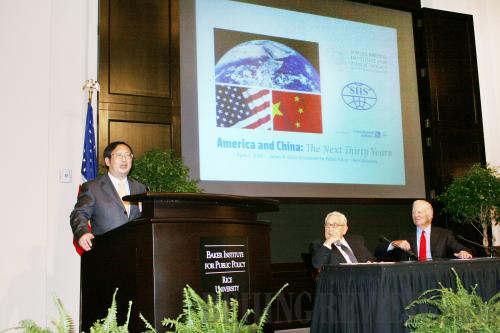|
—Research on national strategy and major world powers' global strategies. We have conducted extensive research on the evolution of the world structure, the balance of power in international relations and the reshaping of relations between countries.
—Research on specific policies. We have undertaken research projects on China's foreign relations as well as Shanghai's opening-up strategy, the development of Shanghai's Pudong New District and the World Expo 2010.
—Promoting knowledge about international affairs and informing the public of the government's foreign policy.
—Education. The SIIS offers master's degree programs independently and PhD programs in collaboration with the Shanghai International Studies University and the East China Normal University. It also holds short-term training programs for young foreign scholars.
Tell us about the SIIS' institutes and research centers. What methods do they use in doing research?
Since the beginning of this century, traditional country-based research has proven ineffective in meeting new demands. That's why we have reorganized research departments devoted to country studies into institutes focusing on specific issues or areas.
We have six institutes: the Institute for International Strategic Studies, the Institute for Global Governance Studies, the Institute for Economic Comparative Studies, the Institute for Foreign Policy Studies, the Institute for Data Processing Studies and the Institute for Taiwan, Hong Kong and Macao Studies. At the same time, we have retained country and regional studies by establishing a number of research centers.
We have four research methods:
—Traditional research by studying newspapers, periodicals and academic theses.
—Open-door research. We send a large number of researchers on short-term or long-term research missions to foreign countries. Every year, we also receive more than 200 groups of foreign visitors, with whom we exchange ideas on current international affairs, as well as theoretical and strategic issues.
—Brainstorming. We hold about 20 domestic seminars and 20 international seminars every year for academic exchanges.
—Teamwork. We organize scholars into specialized research groups in a bid to overcome the disadvantages of individual research.
 |
|
HAVING A SAY: SIIS President Yang Jiemian delivers a speech on Sino-U.S. relations at the James A. Baker III Institute for Public Policy at Rice University in Houston, the United States, on April 3, 2009, while former U.S. secretaries of state Henry Kissinger and James Baker look on (COURTESY OF SIIS) | How do you balance research on current international affairs with long-term strategic research?
To strike a balance, we have maintained a division of responsibility among our researchers, with some focusing on long-term research and others working on contemporary issues. Moreover, we have set our own priorities, given the multitude of international issues we face. We believe research institutes affiliated with the Central Government, with their easy access to research resources, can do more research on ongoing issues. We in Shanghai should instead concentrate on medium and long-term issues and comprehensive research projects.
How does the SIIS engage in exchanges with foreign think tanks? What are the advantages?
In a research report released at the end of 2007 by the Philadelphia-based Foreign Policy Research Institute, the SIIS was listed in the "top 10 think tanks in the world (non-U.S.)," evidence of the SIIS' international fame.
Our organizational structure, research methods and sources of funding are all consistent with major think tanks the world over. Our management is also very sophisticated.
In addition, we have maintained close contacts with government departments in a bid to serve national interests. We provide advice to the government by presenting research reports, meeting with officials and attending important conferences.
As China comes into the global spotlight, Shanghai, a showcase of the achievements in reform and opening up, has drawn increasing attention. The World Expo, most notably, has attracted government leaders, parliamentarians and think tank representatives from around the world. Our location in Shanghai gives us a competitive edge. n
| 